Business of Publishing: Books we Love and Recommend
One of the best parts of working in publishing is that there is always something new to learn. Where do we learn it? From books, of course.
Here’s a list of some of the books that have been most helpful to Microcosm workers recently, and that we recommend to you, aspiring publisher / editor / writer / designer / production manager / roller-arounder-in-books. We added a couple in that we published, too.
This is just the tip of the iceberg, of course. We’d love to hear your recommendations!
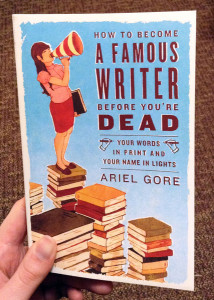 How to Become a Famous Writer Before You’re Dead by Ariel Gore
How to Become a Famous Writer Before You’re Dead by Ariel Gore
This book rules. If you want to write or publish books, read this first. Ariel Gore shows you how to write, publish, and promote what matters to you, and how to build a readership from the ground up. If you want to get into writing or publishing is a get-rich-quick scheme, there are other books about that; this one shows you how to do it because you have a vision to make something meaningful. Full of golden advice from someone who’s done it—and is still doing it—successfully.
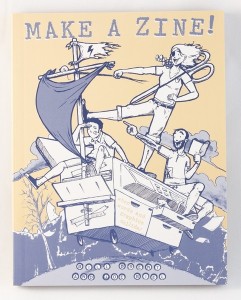 Make a Zine by Joe Biel and Bill Brent
Make a Zine by Joe Biel and Bill Brent
We always recommend that would-be publishers start small—make something yourself that you passionately believe in, learn the trade, and start building a network and a movement before you get mixed up with Amazon, trade distributors or doing any kind of business at scale. This book contains a wealth of information for publishing a zine, comic, or book yourself, with real knowledge about everything from acquisitions to production to marketing.
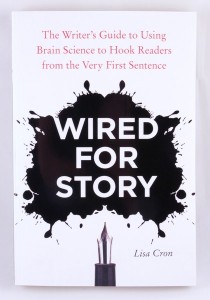 Wired for Story by Lisa Cron
Wired for Story by Lisa Cron
One of our authors recommended this book, and we in turn recommend it to you! The sad truth is that it doesn’t matter how good your writing is if you can’t captivate readers’ attention on every page. Lisa Cron shows you the neuroscience of story, and it’s invaluable. This book is great for writers, editors, and anyone doing title development, aka the publisher.
On Writing Well by William Zinsser
Learning how to tell a compelling story is essential for getting anyone to read that story… actually writing it well is still important for other reasons. William Zinsser is one of the best guides as you learn that part of your craft, as a writer or editor.
The Forest for the Trees by Betsy Lerner
This is the best book we’ve found about what it’s *like* to be an editor. Which is almost as important, if not more important, than the nuts and bolts of learning how to edit. Betsy Lerner has worked in a number of different New York publishing houses and shares stories and knowledge and her valuable experience. If you are an editor, work with one, or want to be one, you’ll glean a lot from reading this.
Understanding Comics by Scott McCloud
If you plan to have anything to do with visual storytelling—comics, picture books, art books, whatever—this guide (in comics form, of course) is very helpful for understanding how to visually tell a story.
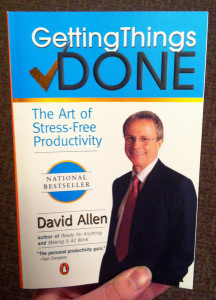 Getting Things Done by David Allen
Getting Things Done by David Allen
People go into publishing because they love books; the reality is that you spend a lot of time with data, spreadsheets, contracts, budgets, production schedules, inventory, software, email, and a gazillion little tasks, each of which is vitally important and intricately relies on many other things being done right. It can all get to be overwhelming, especially if you’re a one-person publishing shop. GTD is the gold standard for organizing your complicated life without succumbing to stress or losing sight of the big picture.
Beyond Dealmaking by Melanie Billings-Yun
Another thing most people learn after launching their publishing career rather than before is that much of the job is about negotiating—contracts, relationships, deliveries, solutions, whatever. There isn’t a lot of abundance in the industry, and people are often in it for very different reasons and with very different expectations. This is hands-down the best book on negotiation that we’ve found, and will teach you real and practical skills for building lasting, sustainable relationships beyond just closing the deal.
Publishing for Profit by Thomas Woll
This book is dense and tough to read. The slog is worth it if you’re serious about publishing as a business, and if you need that business to make money. The best time to read this book is when you have already been doing the work, have some books under your belt, and are starting to wonder if you’re ready for trade distribution and/or to hire a second person.
 Our Band Could be Your Life by Michael Azerrad
Our Band Could be Your Life by Michael Azerrad
Wait, what? This is a history of underground and punk music in the 80s and 90s, not a publishing manual! Actually… this is also very much a book about how to launch a scrappy, ragtag business all the way to the moon, be you a drunk and angry drummer touring in a filthy van or a teenager in your bedroom with a big dream and a cassette duplicator. Microcosm is built on similar foundations, guided much more by the DIY music industry than the book publishing world, and this book can profitably be read as a fascinating case study of businesses run—some more successfully than others—entirely without traditional resources like capital or training, but with no shortage of values, creativity, and pure energy and rage.
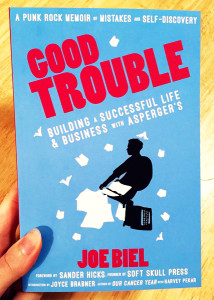 Good Trouble by Joe Biel
Good Trouble by Joe Biel
Microcosm founder and publisher Joe Biel’s memoir can be read through several lenses, and one of them is small press business manual. The company’s often bumpy, sometimes glorious, always edifying history can be found in these pages, along with background on some of the stuff that makes the gears turn—contracts, management, strategy, accounting, proofreading, and more. And if we do say so ourselves, it’s also an excellent example of reader-oriented development, which is what any memoir published today needs beyond all other qualities.
And don’t forget you can read our Business of Publishing blog series right now, without waiting for our store to open or your book to come in the mail.